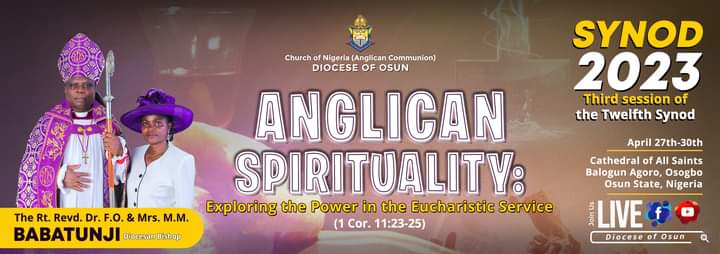YEAR 2023 SYNOD THEME: AN EXTRACT FROM THE BISHOP'S CHARGE

THEME: Anglican Spirituality: Exploring the Power in the Eucharistic Service
TEXT: 1 Cor. 11: 23 - 25
The Concept of the Eucharist
Eucharist is one of the two sacraments acknowledged by Protestant churches. The other is the Baptism. This is because our Lord Jesus Christ inaugurates the two. A sacrament is an outward and visible sign of an inward and spiritual grace. A sacrament is so named because it identifies the place where God has promised, on oath to meet his faithful people. It is the meeting point of God and man. Sacraments are channels of grace. By grace, we mean God's favour, unearned and undeserved, towards humankind. Through it, God forgives His people their sins, enlightens their minds, stirs their hearts and strengthen their will. It is a sacred sign instituted by Christ, through which God bestows his grace or supernatural blessings upon His faithful people.
There are three qualities of a sacrament:
i. It must have been instituted by Christ
ii. There must be an action accompanied by words. In other words, there must be elements: water, bread and wine, then there must be words. There must be elements of creation accompanied by appropriate words.
iii. There must be the right attitude - faith
It is on the above that the our Church (Anglican Church) and other Protestant Churches acknowledge the Eucharist and the Baptism, as the true sacraments, having been directly instituted by Christ, engaging in certain actions as prescribed by the Scriptures, and with faith. God has provided them as channels of certain spiritual benefits, which many are not aware of.
The Catholic and Eastern Orthodox Churches approve seven sacraments namely Baptism, Confirmation, the Eucharist, Penance (reconciliation), the Anointing of the sick, Holy Order and Matrimony. The additional five are recognized by the Protestant Churches as religious rites or ordinances that came up in the course of the worship life of the Church. The differences between the ones adopted by protestant churches as sacrament (Baptism and Eucharist), and the other five, adopted as sacraments by the Catholic and Eastern Orthodox Churches is that Baptism and Eucharist were instituted by Christ, with a command to his followers to carry on with the same as stated in Matthew 28:19 and Luke 22:19-20. The religious rites mentioned above are also vehicles of spiritual blessings to God’s people as individuals, and as a church. Each of these rites also share common qualities with sacraments, apart from the fact that Christ did not directly institute them. The church, the bride of Christ instituted them in the course of her worship of her Lord. Yet, they are also channels of blessing to worshipers. Confirmation, Ordination, Solemnization of Marriage, Anointing through the Holy Chrism, even Absolution and Benediction involve the Bishop or Priest as the case may be to perform certain manual acts, including certain words accompanying them. When these are done by faith, and are received through the same by worshippers, blessings flows from the Lord to His church.
God has allowed the sacraments being an outward and visible sign of an inward and spiritual grace, to manifest openly in the life of a Christian, both physically and spiritually. So when the Christian goes into the sacramental rites, the totality of the person, body, soul and spirit is renewed. Consequently, these sacraments, especially the Eucharist touch every aspect of the Christian. Since the sacraments are particularly chosen channels of God's saving power it is little wonder that they are channels of healing (for example), and other spiritual benefits. Christ’s power to save is applied to every area of human life, through administration of sacraments.
Albeit, and fundamentally, the Eucharist is an act of thanksgiving to the Father, through the Son, in the power of the Holy Spirit for the mighty acts of God in Christ, in His Church now. Yet, it is basically a vehicle of spiritual grace, which is translated into the other dimensions of a believer’s life. As Christians partake in the Eucharist, they express their thanks to the Almighty God for the death of Christ on the cross, which brought liberty, deliverance and healing to them. The Eucharist keeps reminding us of the wonderful victory on the cross, for which we gather to give thanks at the Eucharist. In a typical Anglican Church, there are different forms of services on Sundays, namely Matins/Evensong, Revivals, Holy Communion and Praise Worship/Musical Festivals. However, the Eucharist normally called the Holy Communion stands out as the principal service of the Church.